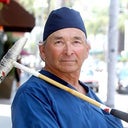Thank you for your question. You state you are on the edge of getting a hair transplant, and you don't want to take finasteride because you don't want to take a drug for the rest of your life and observed results of people with hair transplant without finasteride which appeared impressive. Further, you submitted photos of your father’s scalp to ask whether or not he would get full coverage without taking finasteride if he underwent hair transplant. The gist of your question is can you get a hair transplant without taking finasteride.





